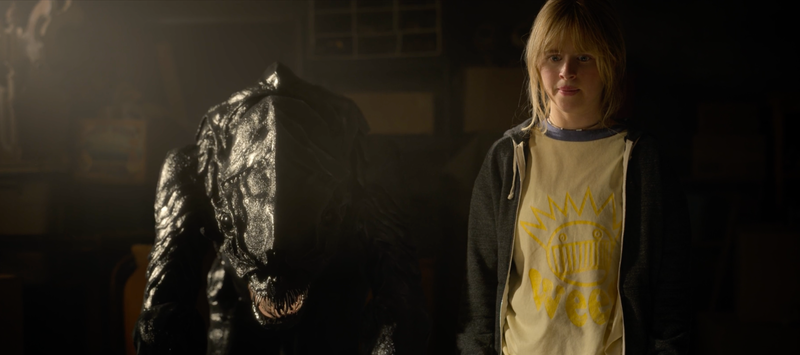
A Gritty Debut, a Bleak Continuation, a Dark Finale
MOVIE REVIEW
The Pusher Trilogy Limited Edition 4K
–
Genre: Crime, Drama, Thriller
Year Released: 1996 (PUSHER), 2004 (PUSHER II), 2005 (PUSHER III), Second Sight Films 4K UHD/Blu-ray 2025
Runtime: 1h 50m / 1h 40m / 1h 48m
Director(s): Nicolas Winding Refn
Writer(s): Nicolas Winding Refn, Jens Dahl (PUSHER)
Cast: Kim Bodnia, Mads Mikkelsen, Zlatko Burić, Laura Drasbæk, Slavko Labovic, Leif Sylvester, Marinela Dekic
Where to Watch: available September 15, 2025, pre-order your copy here: www.secondsightfilms.co.uk
RAVING REVIEW: Few trilogies define a filmmaker’s voice as directly as Nicolas Winding Refn’s PUSHER films. Spanning a decade, these three entries chart Copenhagen’s criminal underworld from shifting perspectives: the hustler scrambling for survival, the screw-up desperate for respect, and the kingpin watching his empire crumble. Each film stands alone, but together they paint a panorama of power, desperation, and inevitability that lingers long after the credits roll.
PUSHER (1996) marked Refn’s feature debut, a film financed on a shoestring and shot with a raw, documentary-like approach. Kim Bodnia’s Frank isn’t a charismatic outlaw but a mid-level dealer undone by bad luck, worse decisions, and a debt he cannot pay. The film’s tension is relentless, not because of stylized violence but because of claustrophobic realism: unpaid debts ticking like bombs, cops closing in, and so-called friends evaporating when things turn ugly. Refn’s handheld camerawork places us in Frank’s headspace, where each knock at the door might be the one that ends him. It was a statement of intent — stripping crime cinema of glamour and giving it back its grime.
Eight years later, PUSHER II (2004) shifted the lens. Mads Mikkelsen, who played the sidekick Tonny in the first film, now takes center stage. Fresh out of prison, he’s still the same wannabe with “Respect” tattooed on his skull — a bitter joke that everyone around him mocks. Yet Tonny’s story is less about crime mechanics and more about identity. The arrival of a baby he may have fathered forces him to confront cycles of abuse, neglect, and patriarchal dominance. His father, a crime boss known as “The Duke,” treats him with open contempt. The tragedy of PUSHER II lies in Tonny’s yearning for validation, even as he stumbles through brutality. Mikkelsen carries the film with quiet devastation; his eyes betray both stupidity and aching vulnerability. It’s here that Refn showed he wasn’t merely interested in the mechanics of deals and debts — he was after the psychology of men poisoned by their environments.
PUSHER III (2005) concludes the arc with Milo, played by Zlatko Burić, a supporting figure in the earlier films who is elevated to the protagonist. This installment is the most unsettling, because Milo isn’t scrambling — he’s struggling to maintain. Older, weary, and trying to manage sobriety, he attends Narcotics Anonymous meetings while planning his daughter’s birthday feast. A botched drug shipment leaves him juggling ecstasy pills instead of heroin, and soon his carefully maintained image unravels. PUSHER III shows the indignities of age in the underworld: losing grip on younger rivals, keeping up appearances for family, and relapsing into violence when there are no other tools left. Buric’s performance is extraordinary, striking a balance between vulnerability and menace. The climax, involving the disposal of a body during a celebration, is as horrifying as it is matter-of-fact.
What unites the trilogy is its refusal to mythologize crime. Refn presents no Scarface mansions, no Tarantino-style banter. His Copenhagen is cramped apartments, dingy clubs, and cheap cars, populated by men whose reach never extends beyond their neighborhood. Violence here isn’t operatic — it’s ugly, often clumsy, and always consequential. Each film ends ambiguously, denying audiences the catharsis they seek. Frank might escape, Tonny might change, Milo might survive — or maybe not. That uncertainty mirrors the precariousness of their lives: there’s never closure, only survival until tomorrow.
Refn sometimes lingers too long on downtime, capturing authenticity at the expense of momentum. In PUSHER, that manifests as a middle section that repeats Frank’s desperate moments. In PUSHER II, Tonny’s fumbling prolongs what we already understand about his incompetence. In PUSHER III, Milo’s birthday subplot occasionally risks trivializing the menace surrounding him. Yet these pauses also deepen immersion, anchoring the films in a realism most crime cinema avoids. The very frustration viewers feel mirrors the trapped lives onscreen.
Seen together, the PUSHER films are about cycles — addiction, debt, family dysfunction, and the way criminal structures perpetuate themselves through new blood replacing the old. Frank’s hustle sets the template, Tonny’s failures show how sons inherit ruin, and Milo’s downfall illustrates that even those at the top are not secure. It’s not a saga of growth or triumph but of inevitability. That bleak honesty is why the trilogy resonates so deeply.
The new Second Sight Films 4K edition solidifies their legacy, not only with restorations overseen by Refn himself but also with extensive supplements that contextualize their impact. Commentary tracks, essays, and companion documentaries position PUSHER not merely as cult cinema but as a pivotal work in Denmark’s modern film history. For cinephiles who admire Refn’s later neon-soaked work, these films are essential — stripped down, unvarnished, and arguably more powerful because of it.
Refn may have gone on to make theatrical statements with DRIVE or ONLY GOD FORGIVES, but the PUSHER trilogy remains his rawest and most compelling work. By keeping his gaze on the street level, he revealed how crime corrodes not just communities but the people who cling to its false promises of power. Together, these three films form a landmark in European crime cinema — brutal, human, and unforgettable.
Please visit https://linktr.ee/overlyhonestr for more reviews.
You can follow me on Letterboxd, Instagram, Twitter, and YouTube. My social media accounts can also be found on most platforms by searching for 'Overly Honest Reviews'.
I’m always happy to hear from my readers; please don't hesitate to say hello or send me any questions about movies.
[photo courtesy of SECOND SIGHT FILMS]
DISCLAIMER:
At Overly Honest Movie Reviews, we value honesty and transparency. Occasionally, we receive complimentary items for review, including DVDs, Blu-rays, CDs, Vinyl Records, Books, and more. We assure you that these arrangements do not influence our reviews, as we are committed to providing unbiased and sincere evaluations. We aim to help you make informed entertainment choices regardless of our relationship with distributors or producers.
Amazon Affiliate Links:
Additionally, this site contains Amazon affiliate links. If you purchase through these links, we may receive a commission. This affiliate arrangement does not affect our commitment to honest reviews and helps support our site. We appreciate your trust and support in navigating these links.



Average Rating